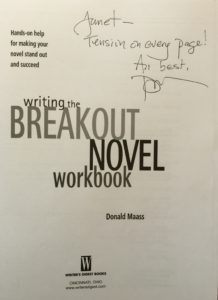A year plus ago I had the good fortune to attend a conference featuring three greats: Christopher Vogler, James Scott Bell, and Donald Maass. I already had books by each one of them, and I carried my copies along for their signatures. One of these is my well-used copy of Maass’s WRITING THE BREAKOUT NOVEL WORKBOOK. He signed it, “Tension on every page!”
In my previous posts I’ve talked about tension and conflict at the most general levels of plot. Maass takes this position: there can’t be too much tension in a novel. As a result, he’s a firm believer in adding tension in every chapter, to every scene, on every page.
To do this he suggests that you randomly turn to any page of your manuscript, select any line at random, and heighten the tension in that line.
Do this on every page of your manuscript until you’ve got the kind of tension that results in a can’t-put-down read. Hard work? You bet.
But let’s look at, first, how little one needs to do, and, second, how hugely it pays off.
I opened THE HUNGER GAMES to a random page, and here’s what I read: “My eyes squint as they try to penetrate the tree next to me, but I can’t make out Rue. Since she tipped me off, it seems only fair to warn her. Besides, if I’m going to die today, it’s Rue I want to win.”
What does Collins do, in this tiny snippet, that is immediately riveting? Let’s look at the verbs: squint, penetrate, tipped, warn, die, win. Each one calculated to be extreme, and to suggest that Katniss is on the edge, unable to fully view the outcome. In addition, Collins doesn’t let up on the physical death stakes: “…I’m going to die today…”
Just to round things out, this paragraph concludes: “Even if it means a little extra food for my family, the idea of Peeta being crowned victor is unbearable.”
Unbearable! Even if her family would get something out of it Katniss is utterly unwilling to tolerate the success of her friend turned ally turned enemy. With extreme internal thoughts and pointed external behaviors in every sentence, Collins does not let her readers off the hook for a second.
If you still doubt the importance of this, take any page of your manuscript right now, and change nothing but the vocabulary. If you have called someone “charming”, change him to “irresistible.” If your character “asks” for something, have them “demand” it. Heighten just the vocabulary and after one paragraph I guarantee you’ll finish the page and then the scene.
Do the same with internal emotional responses, and you’ll be on your way. Yes, it will take time, but you’ll be delighted – no, thrilled – with the results.

